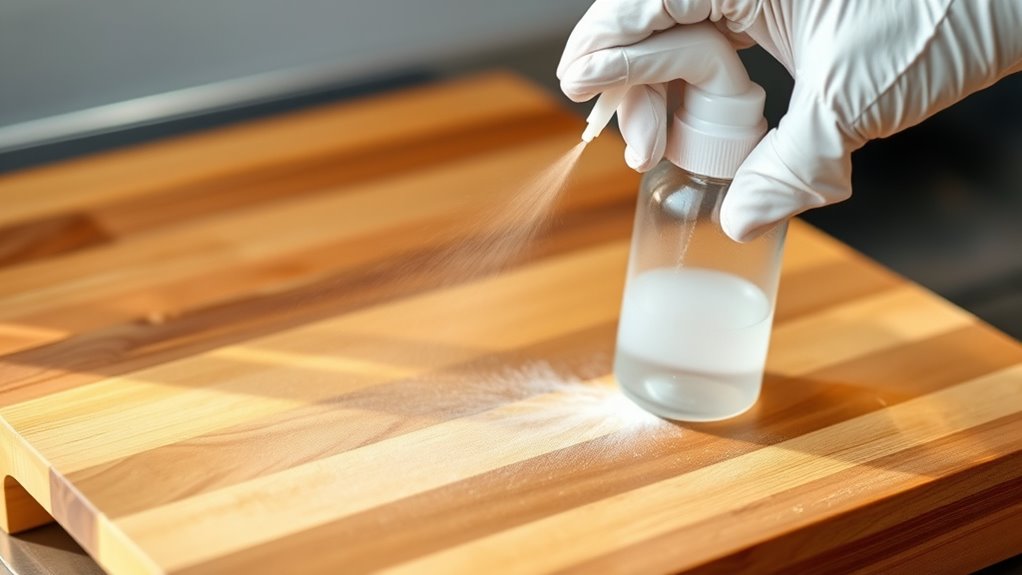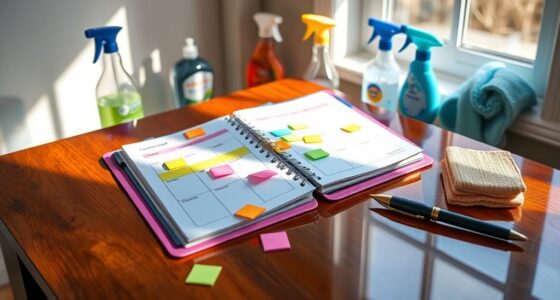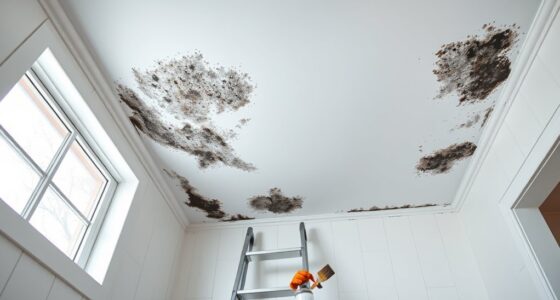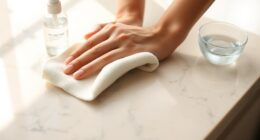To disinfect your butcher block without warping, use natural solutions like white vinegar or diluted hydrogen peroxide sprayed evenly across the surface. Avoid soaking or saturating the wood with excess liquid, and let the disinfectant sit for a few minutes before wiping with a damp cloth. Make sure to dry thoroughly afterward to prevent moisture absorption. For more tips on keeping your butcher block safe and in great condition, keep exploring.
Key Takeaways
- Use natural disinfectants like white vinegar or diluted hydrogen peroxide to avoid excess moisture.
- Spray disinfectants evenly and allow contact time without soaking the wood.
- Wipe with a damp cloth afterward, ensuring minimal liquid remains on the surface.
- Dry the butcher block thoroughly immediately after cleaning and disinfecting.
- Apply food-grade mineral oil or beeswax to seal the surface and prevent warping.

Are you confident your butcher block is truly clean and safe to use? Maintaining your wooden surface properly isn’t just about keeping it looking good; it’s about guaranteeing food safety and preventing bacteria from lurking in cracks or pores. Wood maintenance plays a crucial role here—by caring for your butcher block correctly, you can prevent warping, cracking, or other damage that might compromise its integrity. Proper cleaning and disinfecting techniques are essential to keep your surface hygienic without harming the wood.
Ensuring your butcher block is clean and safe protects your health and prolongs its lifespan.
When it comes to disinfecting your butcher block, it’s tempting to reach for harsh chemicals, but you need to be gentle to avoid warping the wood. Start by cleaning off any food debris with hot water and a mild dish soap. Use a soft sponge or cloth, and avoid soaking the surface—excess moisture can cause the wood to swell or warp over time. After cleaning, rinse with a clean, damp cloth to remove soap residue, then dry thoroughly with a towel. This initial step is vital for wood maintenance because it clears away surface contaminants that could harbor bacteria, ensuring your surface is safe for food prep.
To disinfect without risking warping, you can use natural solutions like white vinegar or diluted hydrogen peroxide. These are effective for killing germs while being gentle on the wood. Spray the vinegar or peroxide evenly across the surface, then let it sit for a few minutes. The acidity of vinegar helps break down bacteria, while hydrogen peroxide is a powerful yet safe disinfectant. After the wait, wipe the surface with a clean, damp cloth to remove any residual solution, then dry immediately with a towel. This method ensures food safety without saturating the wood or causing damage.
Additionally, consider applying a food-grade mineral oil or beeswax after disinfecting. This step not only keeps the wood moisturized but also creates a barrier against moisture absorption, which can lead to warping or cracking. Regularly oil your butcher block—about once a month or as needed—and always ensure it’s dry before applying. Proper wood maintenance through oiling preserves the surface’s integrity, extends its lifespan, and maintains a safe, sanitary environment for food prep.
Frequently Asked Questions
Can I Use Bleach to Disinfect My Butcher Block?
Yes, you can use bleach to disinfect your butcher block, but you must follow bleach safety guidelines carefully. Use a diluted solution—about one tablespoon of bleach per quart of water—and apply it briefly, then rinse thoroughly. Be cautious because excessive or prolonged bleach exposure can lead to wood warping. Always disinfect in a well-ventilated area and guarantee your butcher block dries completely afterward to maintain its integrity.
How Often Should I Disinfect My Butcher Block?
You should disinfect your butcher block at least once a week to maintain cleanliness and prevent bacteria buildup. For regular maintenance, clean after each use with hot water and mild soap, then disinfect weekly. Use a safe disinfectant like diluted bleach or white vinegar, ensuring it doesn’t warp the wood. Consistent cleaning frequency and proper maintenance tips keep your butcher block safe, durable, and in excellent condition.
What Natural Disinfectants Are Safe for Butcher Blocks?
You can use natural disinfectants like antimicrobial herbs, such as thyme or oregano, which have antibacterial properties. Additionally, applying natural oils like mineral oil or beeswax helps seal the wood and provides a protective barrier. Mix herbs with vinegar or lemon juice for an effective, safe disinfectant. These options keep your butcher block clean without risking warping, ensuring it stays durable and hygienic for your kitchen tasks.
Does Disinfecting Damage the Wood Over Time?
Disinfecting your butcher block doesn’t necessarily damage the wood over time if you use proper techniques. You help preserve the wood by avoiding harsh chemicals that cause unwanted chemical reactions, which can weaken the surface. Instead, opt for natural disinfectants like vinegar or lemon juice, and make certain you dry the wood thoroughly afterward. Regular maintenance and gentle cleaning keep your butcher block durable and safe without risking warping or damage.
Can I Use Vinegar as an Effective Disinfectant?
Did you know that vinegar can kill up to 82% of bacteria? Yes, vinegar is a natural cleaning powerhouse, making it an effective disinfectant for your butcher block. Its acidity helps eliminate germs without harsh chemicals, and it won’t warp your wood if used properly. Simply spray or wipe your surface with vinegar, let it sit briefly, then rinse with water to keep your butcher block clean and safe.
Conclusion
Now that you know how to disinfect your butcher block properly, imagine it staying pristine and germ-free forever, like a fortress of cleanliness resisting the mightiest bacteria armies. With just a little effort, you’ll turn your countertop into a sparkling, warping-free sanctuary where food prep feels safer than ever. Keep up the routine, and your butcher block will stand tall and proud, a shining shield against germs—an unstoppable fortress of cleanliness!









